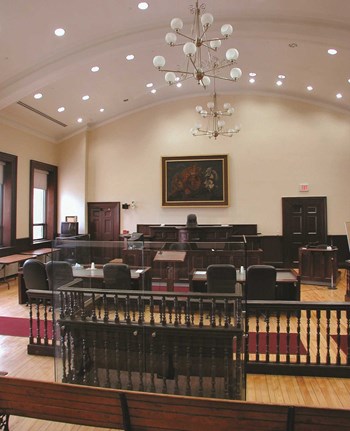
Lawsuits are usually not an association’s go-to method for dispute resolution. Expensive and time-consuming, they can quickly turn into a financial burden and may create strained relations in the community. Unfortunately, in some cases there’s no other way out. Last year a couple filed a suit against a neighbor, the association, individual board members, and property managers, who all neglected to respond to the couple’s complaint of odors infiltrating their unit, the result of 20 cats inhabiting the neighbor’s unit below.
This may have been an extreme case but most associations will be involved in a lawsuit at some point, though the length and, certainly, the price tag may vary. “Factors determining the cost include the nature of the litigation, the complexity of the issues and whether there is the necessity to hire consultants and experts to assist the association,” says Ken Zeilberger, an attorney and a partner in the Community Association Law Group at Margate-based Katzman Garfinkel & Berger. “By way of example, a foreclosure action against an owner who refuses to pay his or her assessments, would in many cases be a relatively simple matter as opposed to an action brought against a developer for construction defects and deficiencies.”
Regardless of the cost or type of complaint, there are a few basic points about lawsuits that all associations should be aware of.
The Basics
Unless you live in a utopian condo association, lawsuits are bound to happen. The most common ones include noise complaints between neighbors, construction defects in units and attempts to collect delinquent payments from residents. But how does a lawsuit begin? “A lawsuit typically begins with the serving of a summons and complaint, which sets forth an association’s claim against the defendant,” says Zeilberger.
Whether an individual files a suit against an association or an association files against a resident, doesn’t mean the case in on the express route to court. “The party who is served has 20 days within which to respond to the complaint. The defendant can either substantively answer the complaint or file a motion to dismiss,” says Zeilberger. Basically, if the defendant chooses to answer it, it means the two parties are now legally considered to be “at issue.” Otherwise, the defendant can seek to dismiss it on two grounds: he or she can say that the suit is not strong enough for “a cause of action” or the defendant can try to dismiss the suit by virtue of an “affirmative matter,” meaning that while the complaint may be true, the case for blame on the defendant may not be sound.
Surprisingly, most cases are settled before the completion of a trial, says Ken Direktor, a shareholder attorney and chair of the Community Association Practice Group at the West Palm Beach offices of Becker & Poliakoff. “When you take a case to a judge or an arbitrator you are ultimately surrendering control over a decision that affects the community to someone who really has no connection to your community. So it is always best to use every possible effort to resolve these disputes between the owners of the property.”
Don’t Go At It Alone
That said, legal experts cannot recount how many times residents, property managers or even entire boards have tried to immediately resolve the dispute themselves, ultimately creating more legal challenges.
A trap that associations find themselves is selective enforcement. “If an association is lax in enforcement, that word gets out. And it's often hard to bring the association back on track,” says Jay Steven Levine, owner and shareholder attorney at the Jay Steven Levine Law Group in Boca Raton. Not only does inconsistent rule enforcement get boards in trouble, but empty threats can result in issues as well. “The word may well get out that the association sends demand letters and nothing happens. And then people will not take the association seriously, and you're going to find more of a proliferation of violations,” says Levine.
Any lawsuit is public record, so parties involved in a lawsuit don't have to worry about invasion of privacy, but boards especially should be careful about how they discuss lawsuits. “Any meeting where the association’s counsel is present, does not need to be an open board meeting, as discussions are protected by the attorney/client privilege. Again, depending on the nature of the litigation, i.e., whether it is pending against a unit owner or some other third party, will dictate the amount and nature of the discussion amongst the board,” says Zeilberger.
Although lawsuits can take a toll on pocketbooks, associations or boards may be covered by their general liability insurance or Directors & Officers coverage, respectively. “The first thing that an association must do if they're sued is put their carrier on notice, because the insurance industry is providing defense counsel for a fairly broad variety of lawsuits brought against associations, some of which even involve defense of cases brought over amounts due over an unpaid contract,” says Direktor. “So it's always advisable to put a carrier on notice because you might get defense provided by your carrier. It's important to know any case involving enforcement of the documents, whether it be for a condo, HOA or co-op, the prevailing party is entitled to recover its legal fees. But still, it's advisable to put your carrier on notice if you're sued.”
In the first phases of a lawsuit, the involvement of the association attorney is crucial in steering the board or association toward a lawful and appropriate path to a resolution.
Let’s Talk Money
Lawsuits are no cheap matter, that’s a given. However, predicting the cost of a suit is difficult. “A lot of the expense really depends on the defense. The defendant will somewhat drive the cost. If there's a selective enforcement issue, and there's numerous other violations, and there's depositions to be taken, that obviously drives up the costs, and does add to the length of the proceeding,” says Levine.
While the subject matter of the suit can play a crucial role in how much a lawsuit can cost, the expectation of the parties can sometimes be even more influential. “One of which is coming into the lawsuit with an unreasonable set of expectations, or an unwillingness to even discuss or consider compromise,” says Direktor.
“If you come into a lawsuit with either of those mindsets you're going to spend more money. The reasonableness of the parties, the ability of the parties to communicate and reach common ground, or the lack thereof will impact the nature of the litigation. The way the case is litigated can also affect the litigation. If you have a case where people go crazy with discovery and document review, and nobody's willing to agree on any aspect of the lawsuit, it will simply take more money to work up the case of the lawsuit.”
Any Alternatives?
Lawsuits that spiral into expensive and damaging affairs don't happen overnight. “In order to get to trial, you have to mediate, that's a requirement in Florida. How early we do it, if I feel I know my case, and I know their defenses, and I don't need to take more depositions, and get more information to be prepared, I'm going to suggest early mediation,” says Levine. “Because in Florida, the prevailing party gets the fee; the earlier you have the resolution, the lower the amount of the fees, and if the association is not willing to waive the fees, the earlier and lower the fees, the better chance the association will recover all of its fee or at least a significant portion.”
Parties can meet on their own, even without the presence of an attorney, but recently many residents and associations seek the guidance of mediation experts, who serve as a kind of neutral buffer and offer constructive methods to reaching a compromise.
Downside of Constant Litigation
The occasional lawsuit will not cripple an association, but a long history of litigation may hurt a community’s standing with prospective buyers and lenders. “An association that is extremely litigious, and who gets sued often, may find that its insurance rates have increased due to the foregoing,” says Zeilberger. “There can be other effects with respect to the purchase of units in the communities, as lenders who provide loans to unit purchasers may consider the amount of litigation when underwriting their loans.” Seeing an association deeply indebted by litigation, may prompt prospective buyers to question the association’s financial stability in addition to its community relations: if there are constant lawsuits, might the board be ruling ineffectively? Or are there hostile relations between the board and residents or residents themselves?
And, of course, insurance rates and lenders are not the only downsides to a lawsuit-heavy association. “With vitriolic lawsuits, it affects the quality of life of everybody who lives there. Could you imagine living in a building where if you approach the elevator, and there's someone in the elevator that you simply can't be in the elevator with? Who wants to live like that?” says Direktor. “A lawsuit can permeate the entire culture and the community. It can affect the tone and discussion at board meetings, at the pool, and the way that neighbors coexist with each other.”
Needless to say, lawsuits can be an expensive and time-consuming experience for residents and associations alike. Though pursing mediation prior to filing can produce cheaper and quicker results, it might not work for all complaints. Should you find yourself involved in a lawsuit, seek counsel of the association’s attorney who can help you determine the best legal route to pursue.
Maggie Puniewska is a freelance writer and a frequent contributor to The South Florida Cooperator. Editorial Assistant Tom Lisi contributed to this article.






Leave a Comment